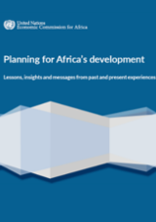Planning for Africa’s development

Development planning in Africa predates independence and remains an enduring feature of the policymaking landscape. Despite a brief interruption during the structural adjustment programme era the most recent decade has witnessed a resurgence of development planning and an evolution from its focus on poverty reduction to a renewed emphasis on structural economic transformation. In a sense, the focus of planning has come full circle, and has returned to the post-independence vision of structural transformation. Notwithstanding these developments, after over fifty years of development planning, inclusive economic growth, poverty reduction and structural transformation remain elusive developmental objectives in most African countries. By contrast, development planning has been a key to the successful transformation of emerging economies, particularly in Asia. This raises the question of why development planning has not been as effective in stimulating transformation in Africa, and what conclusions Africa can draw from its own experiences, as well as from those of countries that have succeeded in transforming their economies.
This study seeks to address both the above questions through an analysis of the development planning experiences of nine African1 country case studies complemented by desk research on other relevant countries including some from Asia.2 The case studies comprise a rich blend of experiences reflecting the unique historical, economic and political contexts within which planning has evolved. Two of the countries (i.e. Cabo Verde and Seychelles) provide experiences from the perspective of small island developing States, with their unique challenges of vulnerability to climate change and limited natural resources. Others such as Nigeria highlight the planning experience of a populous oil-rich African country with a federal system of governance. The development planning context of Ethiopia is unique, not only because it was never colonized, but also because of its prehistory as a monarchy. Similarly, South Africa stands out from other African countries because of its heritage of apartheid, its relatively high level of industrial development and its wealth of natural resources. Ghana brings the perspective of the first country in Africa, excluding North Africa, to achieve independence. The nine African country case studies have been complemented by desk research on Egypt, a country whose current planning experience has been influenced by the Arab spring.